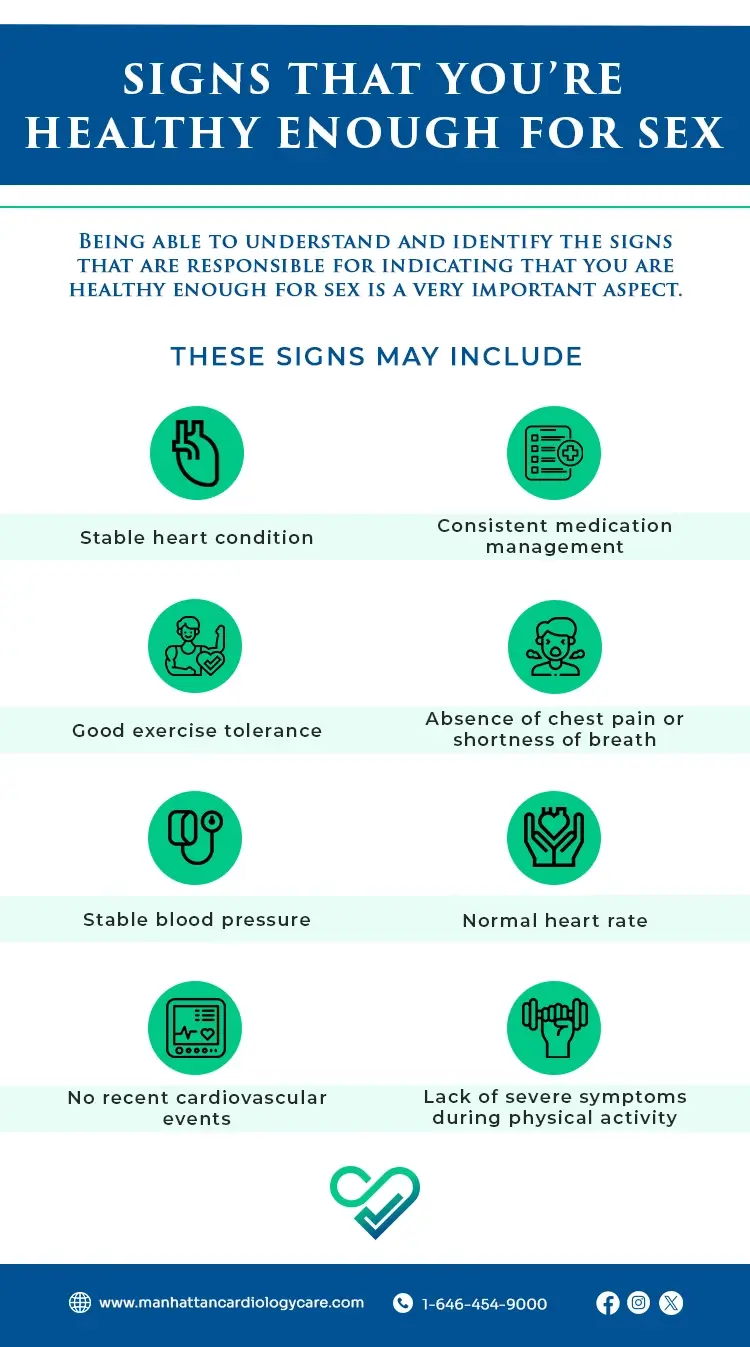Have you ever wondered about the relationship between sex and heart disease? The world of healthcare revolves around our physical well-being, but what about the impact of heart diseases on our sex life?
Can people with heart conditions safely have sex? or should they be cautious about it? Is ejaculating good for the heart? And can we have sex after heart attack?
Join us as we explore the answers to all these questions, and discover the connection between sex and heart disease.
Table of contents
Is Sex Safe For Heart Patients?
Contrary to the common misconception, engaging in sexual activity is generally safe for individuals who are suffering from any of the heart diseases.
In fact, several researches have indicated that regular sexual activity can have a positive impact on the heart’s health – However, it is important to consult healthcare providers, such as the expert heart doctors at Manhattan Cardiology Care, to assess the individual risk factors, and offer a personalized consultation that is specific to your condition.
Understanding your individual health status makes sure that you have a safe and enjoyable intimate life without risking your cardiovascular well-being.
How Can a Heart Disease Affect Sex Life?
Sex and heart diseases are closely interlinked – so much so that a heart disease can influence several aspects of one’s sexual health.
Reduced blood flow, consumption of medications, and anxiety about one’s heart health can surely contribute to challenges in achieving or even maintaining an erection for men – while women might experience changes in arousal and lubrication.
Why Do Heart Patients Experience a Loss in Sex Drive?
The link between deteriorating drive for sex and heart disease is multifaceted. Physical factors, such as fatigue and medication side effects, can also play a role in this deterioration.
Additionally, the psychological impact that heart diseases have on individuals in the form of fear of living with a chronic condition, is also a contributing factor to stress, anxiety, or depression; all of which can affect libido, i.e. our drive and desire for physical intimacy.
Signs That You’re Healthy Enough for Sex
Being able to understand and identify the signs that are responsible for indicating that you are healthy enough for sex is a very important aspect.
These signs may include:
- Stable heart condition
- Consistent medication management
- Good exercise tolerance
- Absence of chest pain or shortness of breath
- Stable blood pressure
- Normal heart rate
- No recent cardiovascular events
- Lack of severe symptoms during physical activity
Heart-Healthy Benefits of Sex
Some people might not believe the idea, but engaging in regular sexual activity can actually offer benefits for our heart’s health.
The benefits of sex that strengthen the connection between sex and heart diseases include:
- Cardiovascular Workout: Regular sex is quite similar to a cardiovascular workout as it elevates the heart rate and increases blood flow, promoting better circulation throughout the body. This natural exercise helps to maintain the flexibility and health of blood vessels, reducing the risk of cardiovascular issues.
- Stress Reduction: Sex is known to have remarkable stress-reducing effects. During sex, the body releases endorphins, often referred to as “feel-good” hormones. These chemicals not only enhance mood but also act as natural stress relievers, contributing to lower blood pressure and a healthier heart.
- Improved Sleep Quality: Normal Sleeping Heart Rate Sexual activity can promote better sleep quality.. The release of oxytocin, often known as the “love hormone,” fosters feelings of relaxation and connection. This, in turn, can lead to improved sleep, a crucial factor in maintaining overall cardiovascular health.
- Immune System Boost: The immune system receives a boost from regular sexual activity. The increased production of immunoglobulin A (IgA), an antibody that plays a vital role in immune function, contributes to a stronger defense against common illnesses, indirectly supporting heart health.
- Calorie Burn and Weight Management: While sex may not replace a full-fledged workout routine, it does burn calories. Engaging in regular sexual activity can be a complementary aspect of weight management, which, in turn, positively impacts cardiovascular health and reduces the risk of obesity-related heart issues.
- Pain Relief: Sexual activity has been associated with pain relief, thanks to the release of endorphins. For individuals managing chronic pain conditions, this natural analgesic effect can improve overall well-being and reduce stress on the cardiovascular system.
- Hormonal Balance: Intimacy contributes to hormonal balance, with positive effects on heart health. Oxytocin and estrogen, hormones released during sexual activity, play roles in regulating blood pressure and supporting the health of the cardiovascular system.
Sex After Heart Attack
Resuming sex after heart attack is a commonly occuring concern. While it’s crucial to follow your healthcare provider’s guidance, most individuals can gradually reintroduce sex into their lives.
This process involves open communication, understanding physical limitations, and making adjustments to accommodate both emotional and physical well-being.
Sexual Activity After Surgery
For individuals who have undergone a heart surgery, the resumption of sexual activity often requires a thoughtful and gradual approach. Clear communication with healthcare providers, understanding the impact of surgery on the body, and following prescribed recovery timelines are immensely important in ensuring a smooth transition back to a healthy and satisfying sex life.
Conclusion
The connection between sex and heart disease makes it evident that heart health and sexual well-being are intertwined. At Manhattan Cardiology Care, we recognize the importance of addressing these connections and supporting our patients in achieving a harmonious balance between cardiovascular health and their sex life.
If you have further queries or concerns about how to deal with sex and heart diseases, our experienced team is here to provide personalized guidance and support. Your heart matters, and so does your intimate well-being – let us help you navigate both with care and expertise.
Frequently Asked Questions
Is sex OK with heart disease?
Yes, in many cases, sex is considered safe for individuals with heart disease. However, it's crucial to consult with your healthcare provider to assess individual risk factors and receive personalized guidance. Understanding your unique health profile ensures a safe and enjoyable intimate life without compromising cardiovascular well-being.
Is sex a good exercise for the heart?
Yes, sexual intimacy can be a form of exercise for the heart. It increases heart rate and engages various muscle groups, promoting cardiovascular health. However, it's important to note that while sex can contribute to overall physical activity, it may not replace a regular exercise routine. It's advisable to maintain a well-rounded approach to fitness for optimal heart health.
Is masturbation harmful for the heart?
Generally, masturbation is not harmful to the heart. In fact, it is considered a normal and healthy part of sexual expression. Masturbation does not typically pose cardiovascular risks and is not associated with heart disease. As with any health-related concern, if you have specific questions or concerns, it's advisable to consult with your healthcare provider for a more personalized advice.
– Disclaimer –
This blog is for informational & educational purposes only, and does not intend to substitute any professional medical advice or consultation. For any health related concerns, please consult with your physician, or call 911.


